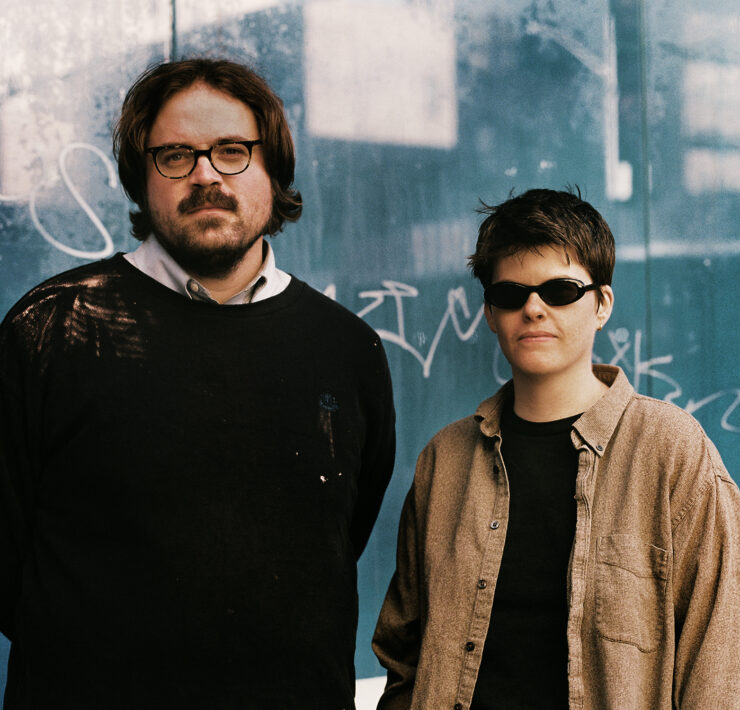Faro Kitchen Serves Up Inclusion and Healthy Edibles

Addison Herron-Wheeler is OUT FRONT's co-publisher and editor-in-chief and friend…
The edibles market in Colorado is saturated with companies promising dank, gooey, sugar-filled goodies that will deliver a crazy high. Often, they are marketed to tourists and anyone looking for a quick and easy buzz. Faro, a queer women-run and all-natural edibles company, takes a different approach.
The founders of Faro, Paige Kazazian and Stacie Nagy, run the show with attention to the healing effects of cannabis, the ingredients that go into each edible, and the ethics of the company. The two met in North Carolina, so they’re familiar with being in the minority as far as being queer women and cannabis enthusiasts.

Holistic Medicine, Not Cheap Highs
“The focus is on consistency, low-dose, refined, sugar-free, health conscious products, made with [ingredients like] dates or local Colorado honey,” explained Kazazian. “Our edibles are gluten-free, dairy-free, soy-free, egg-free; that’s the biggest difference, and from there we really care about the quality and the ingredients that we use. We believe the food we put in our bodies is as important as the cannabis we put in our bodies.”
The product was born from a desire to have edibles that are good products to dose with daily, both in terms of the dosage they offer and the ingredients they are made up of.
“What really brought us together around this company is that neither of us is interested in getting stoned or getting high all that often, but [we both] believe in the medical benefits [of cannabis], explained Nagy. “If you were taking a medicine, you wouldn’t take it once a week; you take it daily as prescribed. If you want the medical benefits of cannabis, why are you taking a gummy or a chocolate once a week? We were craving something we could eat daily or a couple times a day to get continued benefits.”
All of Faro’s edibles are superfood bites, and the cannabis is paired with healthy ingredients, like matcha tea and espresso beans for those who want an energy boost, but don’t want to pair smokeables or sugary cannabis treats with equally-sugary coffee. Those who don’t want the extra buzz can try bites with flavors like almond, chia seed, pistachio, or cherry. The bars are all made with attention to the type of cannabis used as well, and many contain cannabidiol or CBD.

Bootstrapping the Bankroll
Another thing that sets Faro appart from a lot of the cannabis companies in Denver is the lack of capitol behind their venture. Unlike some of the start-ups that come into town with a hefty bankroll to blow, Faro are doing it all themselves.
“We both come from working to middle class families in the south, and funding isn’t as strong for us as it may be for those coming from finance or real estate, or from Denver,” admits Nagy. “We are fundraising; we just did a round of dispensary samples to get letters of intent.”
Both Nagy and Kazazian have had to work full-time jobs to finance their company, rather than spending all their time on the venture and waiting for it to pay off. Still, they claim that once they begin turning a profit from their company, they want to take reduced salaries so that their team can make $15 an hour, and they plan to give a chunk of their proceeds back to charity.
Powered by Queerness and Intersectional Feminism
Their strong commitment do doing the right thing in spite of limited funds comes from the fact that all those involved with the business are queer women, and some are queer women of color.
In addition to Nagy and Kazazian, Cynthia Ruiz, who identifies as Chicana or Mexican-American, is director of sales (and Kazazian’s girlfriend), and Katya Weiss-Anderson is head chef. The team is also fully committed to prioritizing the hiring of queer folks, women-identified individuals, and people of color once they are able to expand, and also try to work with companies owned by minorities and queer people for packaging, distribution, and graphic design whenever possible.
As southerners, Nagy and Kazazian would like to donate part of their salaries specifically to the Southern Poverty Law Center, in an effort to help those who have been arrested for cannabis use in the south, especially the people of color that are wrongly victimized in racially-segregated areas that still engage in prohibition.
“We want to help groups like Southerners on New Ground who help purple and blue the southern states and open up the environment for something like legalization,” explained Naggy. “We also want to help make things more hospitable for the queer community, and that kind of manifests in paying our employees a living wage.”
The women acknowledge that the industry is still heavily biased towards men, not to mention lacking inclusion for the queer folks who so readily consume cannabis, and of course for the people of color who have been demonized by prohibition.
“I think the biggest disappointment for how the industry has evolved so far is how relatively shut out of the industry people of color and queer people of color have been, especially since law enforcement has born its weight on them,” explained Nagy.
“It’s alarming and there is a lot of work to be done,” Kazazian added. “I think also in terms of the queer community being such big consumers, cannabis was first brought to a medicinal standpoint because of the AIDS crisis and the gay activists in California who propelled our issue forward. It is now a very cis-white-heteronormative culture. It can be intimidating to go to some of these events and parties; everyone there is whiter, affluent, older. But what matters is being numbers and data and analytics-driven. It doesn’t matter what my background or experience is; I know that is something seriously needed in the industry.”
A Brighter Future
As the industry continues to grow, women, people of color, queer folks, and those from low-income backgrounds are getting more and more opportunities to be involved, despite all the setbacks they still face.
Faro would like to see those opportunities multiply. They would also like to see cannabis products made from holistic ingredients and infused with high-quality cannabis made available for those who need to medicate.
“Just like how we want to change how edibles are consumed, we want to be a beacon of light to other startups and existing businesses,” explained Kazazian. “That is why our imagery is a lantern. It’s about consistency, quality, ethical products produced. I would love in the future to have a queer-owned collective. I would love to have multiple people working on the same license to help each other, throw down on rent together, go to support different events and things in the city together. If there are any queers who want to work in the industry, we would love for them to reach out.”
What's Your Reaction?
Addison Herron-Wheeler is OUT FRONT's co-publisher and editor-in-chief and friend to dogs everywhere. She enjoys long walks in the darkness away from any sources of sunlight, rainy days, and painfully dry comedy. She also covers cannabis and heavy metal, and is author of Wicked Woman: Women in Metal from the 1960s to Now and Respirator, a short story collection.










